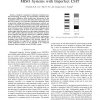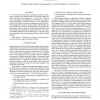20 search results - page 4 / 4 » Opportunistic Feedback in OFDMA Downlink |
VTC
2007
IEEE
13 years 11 months ago
2007
IEEE
—This paper presents a downlink performance analysis of a Layered Random Beamforming (LRB) - MIMO-OFDMA Physical Layer (PHY) as applicable to future generation wireless communica...
VTC
2007
IEEE
13 years 11 months ago
2007
IEEE
— In this paper we analyze the downlink OFDMA system-level performances of a 2x2 dual-stream MIMO multiuser transmission scheme under the assumptions of partial and noisy channel...
ICC
2007
IEEE
13 years 11 months ago
2007
IEEE
—Opportunistic scheduling in random beamforming maximizes the sum-rate by allocating resources to the users with the best channel condition, thus leveraging on multiuser diversit...
ICC
2007
IEEE
13 years 11 months ago
2007
IEEE
Abstract— Adaptive transmission techniques including transmit beamforming, precoding, and opportunistic scheduling offer high spectral efficiency when channel state information ...
ICASSP
2008
IEEE
13 years 11 months ago
2008
IEEE
It is well-known that opportunistic transmission schemes are sumcapacity optimal, in the Shannon sense, for symmetric cellular networks with single-antenna transceivers. However, ...


